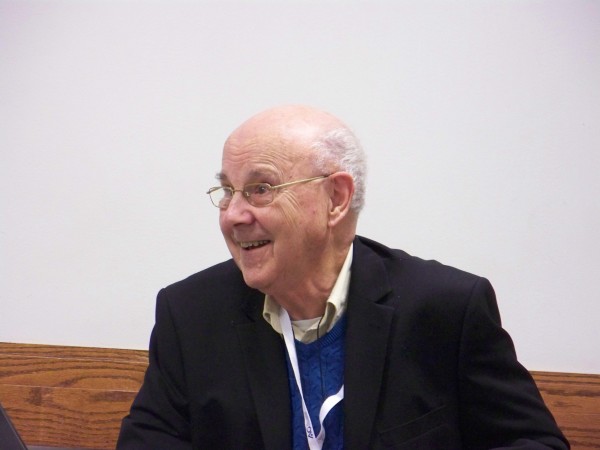Leadership in the Local Church: Discerning Practical Value and Developing Theological Foundations

Peter Hocken at the 2014 convention of the Society for Pentecostal Studies.
The second major idea contributed by Pentecostals to ecclesiology has come from reflection on missionary experience. Initially, many Pentecostal groups experienced phenomenal growth through the Holy Spirit’s endowment of every member. Some missionary labors resulted in numerical expansion but not subsequent equipping of every believer; consequently, reflections on missionary purpose have led to a greater focus on the nature of the Church. Initial conversion to Christ is to be followed by “consciously building the church”, and consciously building the Church includes advising and assisting all members to be filled with the Holy Spirit in power.64 Far from being an esoteric experience for individual mystic enjoyment, the baptism in the Holy Spirit and accompanying spiritual gifts are graciously granted to believers by God as a divine enablement for service.65 Duffield and Van Cleave agree:
The chief purpose of the Baptism with the Holy Spirit is that the believer might have power for Christian service. It may well be that the greatest promise given to the Christian is that given by Jesus to His disciples just prior to His Ascension: “But ye shall receive power, after that the Holy Ghost is come upon you: and ye shall be witnesses unto me both in Jerusalem, and in all Judea, and in Samaria, and unto the uttermost part of the earth” (Acts 1:8). This power for special service is the distinctive result of having been filled with the Spirit.66
Hocken succinctly summarizes the uniqueness of Pentecostal ecclesiology.
Considering the inherited patterns of Christian worship indicates the distinctiveness of Pentecostal-charismatic understanding of the church. Whereas the preecumenical Catholic pattern presented a hierarchically ordained priest acting in persona Christi offering the eucharistic sacrifice at the altar for the people, and the Protestant pattern presented an educated preacher expounding the Word of God from the pulpit, the Pentecostal pattern is of the Upper Room, an entire congregation filled with the Holy Spirit, giving praise to Almighty God.67
For the Pentecostal pastor, the image of the Upper Room biblically and theologically informs and continually transforms contemporary currents of theory and practice concerning pastoral ministry and leadership.
Understanding the Underpinnings of Leadership Ministry
Important to note is that leadership is ministry and that ministry is theological.68 Pentecostal theology of ministry is essential for effectively leading a Pentecostal congregation. Our doctrine and practice places “a distinctive emphasis on the Holy Spirit’s involvement in all aspects of leadership within the body of Christ”.69 This emphasis is, however, fully compatible with human instruments and abilities in leadership. Since the Day of Pentecost, the Holy Spirit is the administrator of the affairs of the Church (John 14:12; 1 Cor. 12:5-11). The Holy Spirit is the leader controlling all subordinate offices, which are to be occupied by Spirit-filled individuals (Acts 6:3-5). The Spirit is able to direct the selection and function of the Church’s ministerial leadership (Acts 13:1-3). Even church councils should function under his guidance (Acts 15:28). Dependence by Church leaders on the leadership of the Holy Spirit is in keeping with examples of Christ and the apostles (Acts 1:2; 15:28).
Human leaders are “chosen of God and presented as gifts to the body of Christ”.70 The Holy Spirit exerts major influence in the placing of leadership in the body of Christ (Acts 20:28). The ascension gift of Christ was the baptism of the Holy Spirit (dorea). He also gives ministry and leadership gifts such as apostle, prophet, evangelist, pastor, and teacher to the Church (Eph. 4:11). God endows believers with spiritual gifts distinct from natural talents or abilities for the purpose of serving one another in the Spirit of Christ (1 Cor. 12:8-10; Rom. 12:6-9). New Testament role models of leadership demonstrate an experiential acceptance and practical application of leadership by the Spirit (Acts 10:9-23; 16:9). Ray Hughes observes that “Pentecostals view this as the only proper attitude for church leaders. The Holy Spirit is always in charge, and we are servants ready to do his will”.71
True leaders of the Church should perceive themselves as “shepherds of God’s flock” (1 Pet. 5:2), not masters but servants in the Spirit of Christ (Matt. 20:27). Spiritual leaders are ambassadors of Christ (2 Cor. 5:20) acting only on his authority (John 14:13; 15:16). The gestalt of Pentecostal leadership involves a divine-human relationship and partnership played out in the theater of everyday decisions and actions.
For the Pentecostal, therefore leadership is first of all a calling, that which is and shall always remain under the sovereignty of God. Leadership is diverse and individually distinct, consisting of all those varied natural human talents with which God endows men and women, and worked out through the same providence in terms of circumstances and daily happenings. Yet it is more.


